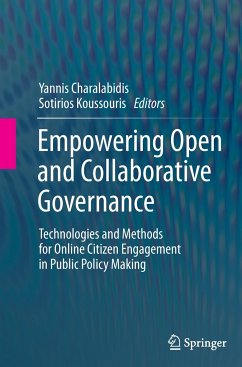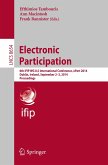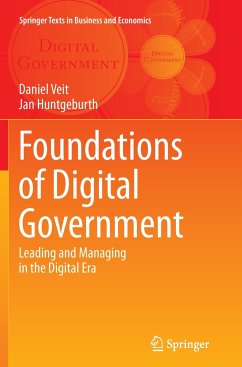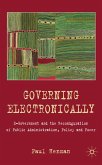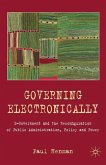The use of information and communication technologies to support public administrations, governments and decision makers has been recorded for more than 20 years and dubbed e-Government. Moving towards open governance roadmaps worldwide, electronic participation and citizen engagement stand out as a new domain, important both for decision makers and citizens; and over the last decade, there have been a variety of related pilot projects and innovative approaches.
With contributions from leading researchers, Charalabidis and Koussouris provide the latest research findings such as theoretical foundations, principles, methodologies, architectures, technical frameworks, cases and lessons learnt within the domain of open, collaborative governance and online citizen engagement. The book is divided into three sections: Section one, "Public Policy Debate Foundations," lays the foundations regarding processes and methods for scoping, planning, evaluating and transforming citizenengagement. The second section, "Information and Communication Technologies for Citizen Participation," details practical approaches to designing and creating collaborative governance infrastructures and citizen participation for businesses and administrations. Lastly, the third section on "Future Research Directions of Open, Collaborative ICT-enabled Governance" provides a constructive critique of the developments in the past and presents prospects regarding future challenges and research directions.
The book is mainly written for academic researchers and graduate students working in the computer, social, political and management sciences. Its audience includes researchers and practitioners in e-Governance, public administration officials, policy and decision makers at the local, national and international level engaged in the design and creation of policies and services, and ICT professionals engaged in e-Governance and policy modelling projects andsolutions.
With contributions from leading researchers, Charalabidis and Koussouris provide the latest research findings such as theoretical foundations, principles, methodologies, architectures, technical frameworks, cases and lessons learnt within the domain of open, collaborative governance and online citizen engagement. The book is divided into three sections: Section one, "Public Policy Debate Foundations," lays the foundations regarding processes and methods for scoping, planning, evaluating and transforming citizenengagement. The second section, "Information and Communication Technologies for Citizen Participation," details practical approaches to designing and creating collaborative governance infrastructures and citizen participation for businesses and administrations. Lastly, the third section on "Future Research Directions of Open, Collaborative ICT-enabled Governance" provides a constructive critique of the developments in the past and presents prospects regarding future challenges and research directions.
The book is mainly written for academic researchers and graduate students working in the computer, social, political and management sciences. Its audience includes researchers and practitioners in e-Governance, public administration officials, policy and decision makers at the local, national and international level engaged in the design and creation of policies and services, and ICT professionals engaged in e-Governance and policy modelling projects andsolutions.
"The collection of articles in this book covers the subject of empowering open and collaborative governance comprehensively and demonstrates the diversity of tools and methods, when tackling the issues and concerns in research and practice. (...). It provides an important contribution for researchers of all forms of digital governance." From the foreword by Ann Macintosh, University of Leeds, UK

